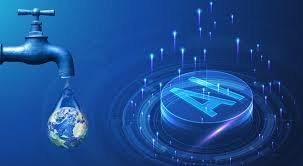How AI is Revolutionizing Water Management in Cities like Mumbai and New York

As urban landscapes continue to expand, cities around the world are grappling with the challenge of maintaining a sustainable water supply. With high-rise buildings emerging daily, the demand for water is skyrocketing. Cities like Mumbai and New York, both known for their towering skylines and growing populations, are turning to Artificial Intelligence (AI) to manage their water systems more efficiently. AI is helping cities predict consumption, detect leaks, and optimize distribution, ensuring that water supply meets increasing demands without wastage.
Challenges in Water Management Due to Rapid Urbanization
Mumbai’s Water Crisis
Mumbai, India’s financial capital, relies on seven reservoirs built decades ago to supply water to over 20 million residents. Despite rapid urban development, the city still depends on these aging sources. With projections indicating a surge in water demand by 2041, the Brihanmumbai Municipal Corporation (BMC) is seeking AI-driven solutions to enhance efficiency.
New York’s Growing Demand
New York City, on the other hand, sources its water from a network of reservoirs, tunnels, and aqueducts spread across the state. As the city’s infrastructure grows, so does its water demand. AI is now playing a crucial role in optimizing water distribution and reducing losses, ensuring that New York can meet its future needs.
How AI is Transforming Water Management
1. Smart Leak Detection and Prevention
AI-powered sensors monitor Mumbai and New York’s vast pipeline networks, detecting leaks before they escalate into major issues.
Example: New York’s Department of Environmental Protection (DEP) implemented AI-driven leak detection systems, reducing daily water loss by 40 million gallons. Similarly, Mumbai has deployed smart water meters to track and reduce leakages in high-consumption areas.
2. AI-Driven Demand Forecasting
AI analyzes historical consumption data, weather patterns, and population growth trends to predict future water demand.
Case Study: IBM’s Green Horizon project has helped cities like New York accurately forecast water needs, enabling authorities to allocate resources efficiently. Mumbai’s water department is now investing in similar predictive analytics to balance supply with demand.
3. Water Quality Monitoring
Real-time AI systems assess water quality, identifying contaminants and ensuring compliance with safety regulations.
Example: New York uses AI-enabled monitoring to track water purity at over 1,000 testing points daily. Mumbai is integrating AI with IoT sensors to detect impurities in its supply network and prevent waterborne diseases.
4. Flood and Stormwater Management
Both cities experience flooding, requiring AI-based forecasting to mitigate damage.
Case Study: New York’s AI-powered flood prediction system helped reduce stormwater overflow damage during Hurricane Ida. Mumbai has initiated AI-driven monsoon prediction models to enhance preparedness and response strategies.
Future Plans for AI in Water Management
Mumbai’s Initiatives
Desalination Plant: AI-backed systems will optimize Mumbai’s upcoming desalination plant to produce 200 MLD of drinking water.
New Dams and Pipelines: AI will monitor and control new water projects like the Gargai and Pinjal dams.
CS Tech AI’s IoT-Based Solution under Jal Jeevan Mission: CS Tech AI has implemented an IoT-based system to transform water distribution management in Maharashtra. This solution ensures that every household has access to safe and sufficient water by integrating IoT devices, centralized monitoring, and real-time analytics. The project exemplifies how technology can drive impactful change in water infrastructure and governance.
New York’s Strategies
AI-Optimized Distribution: New York is expanding its AI water management systems to ensure an even distribution across boroughs.
Smart Metering Expansion: AI-driven smart meters will be installed in more residential buildings to improve tracking and conservation.
AI Tool for Water Quality Prediction: A groundbreaking AI tool has been tested in New York City to predict water quality by analyzing datasets from the National Water Model. This tool can forecast various water quality issues, such as turbidity, ensuring a safer water supply for residents
Conclusion
As urbanization accelerates, cities must embrace AI-driven solutions to manage their water systems effectively. Mumbai and New York are setting global benchmarks in integrating AI for leak detection, demand forecasting, quality monitoring, and flood control. By leveraging AI, these cities are not only securing their water future but also setting an example for other urban centers worldwide.
AI is no longer a futuristic concept—it is a necessity for sustainable water management in modern cities.

